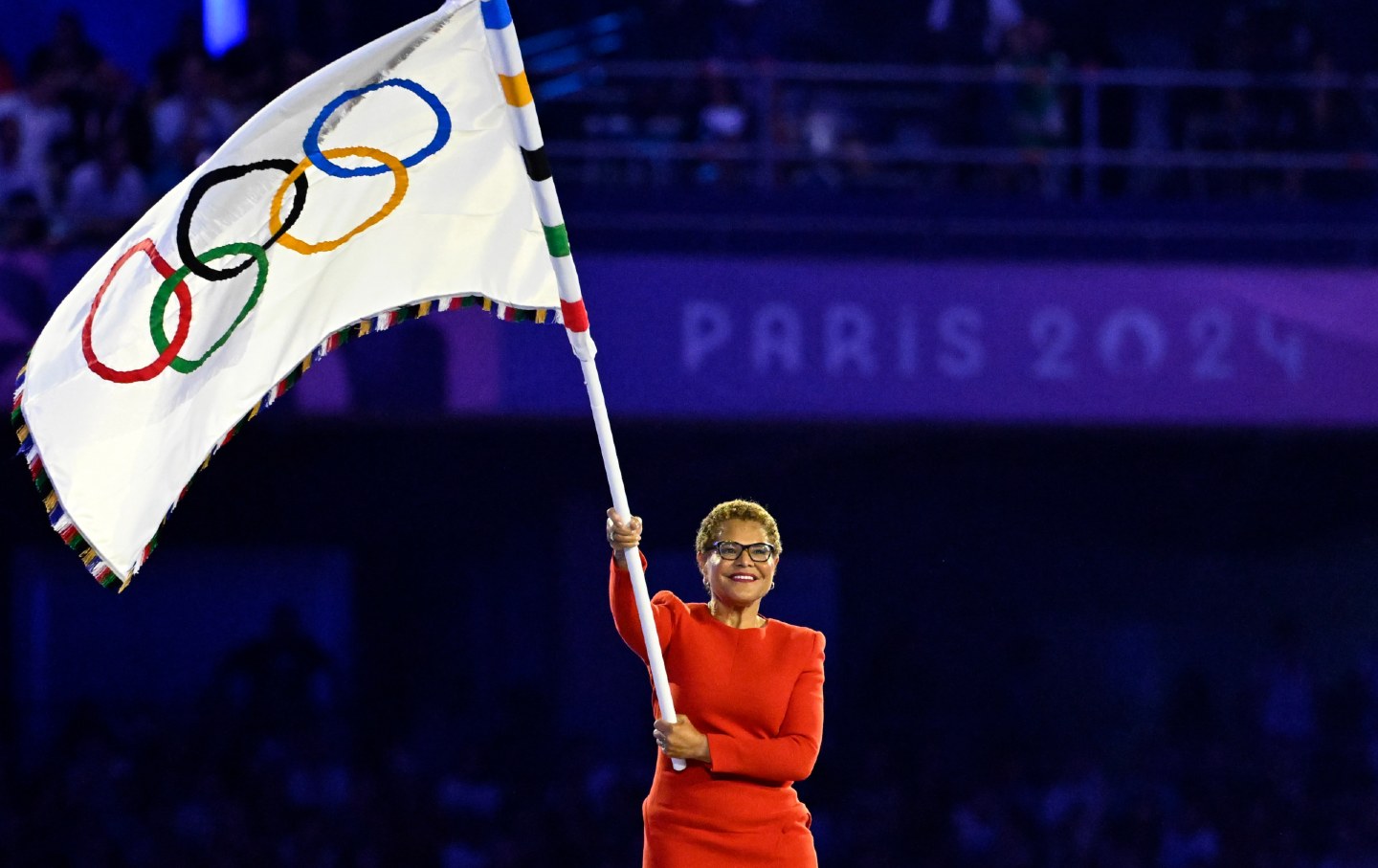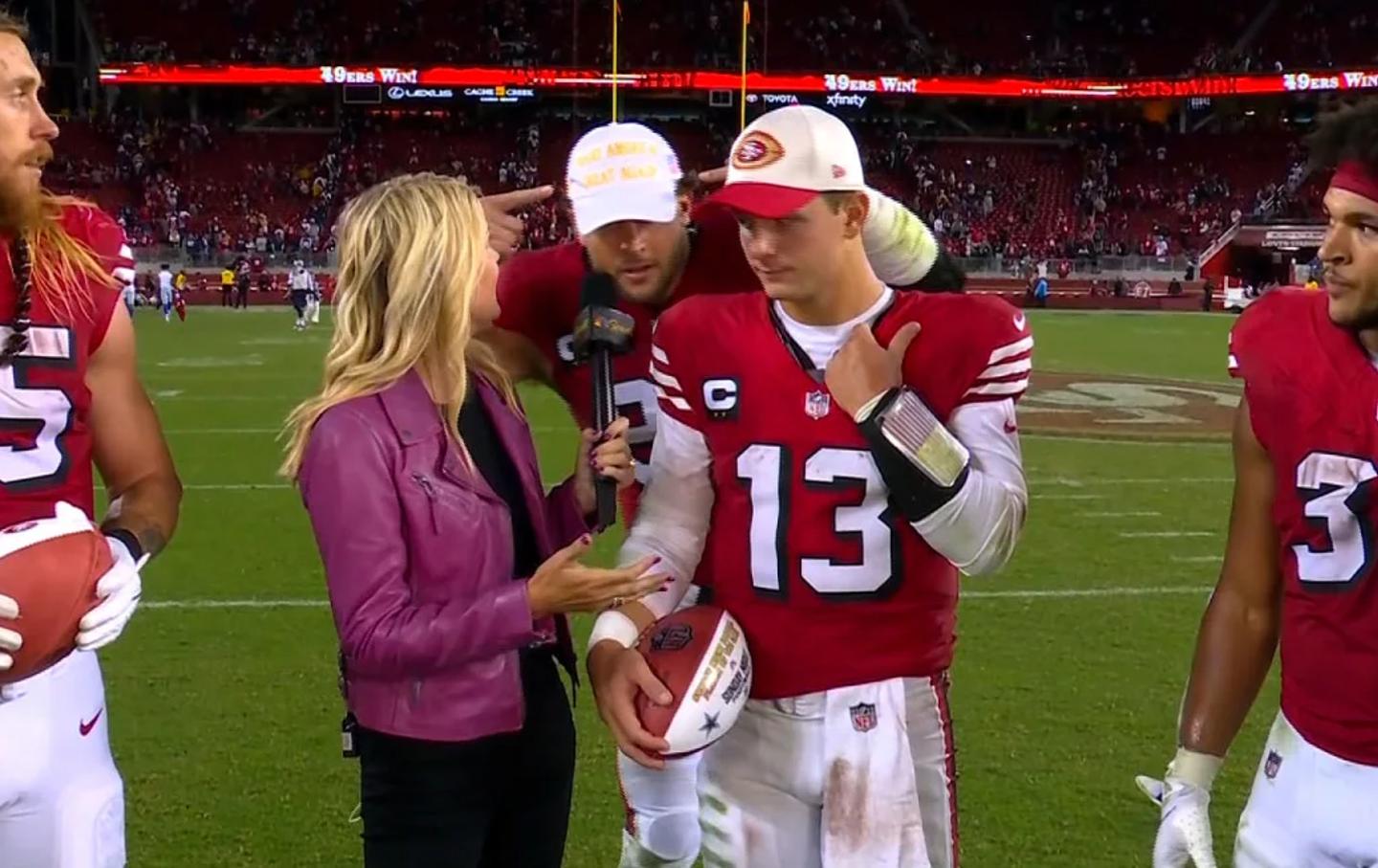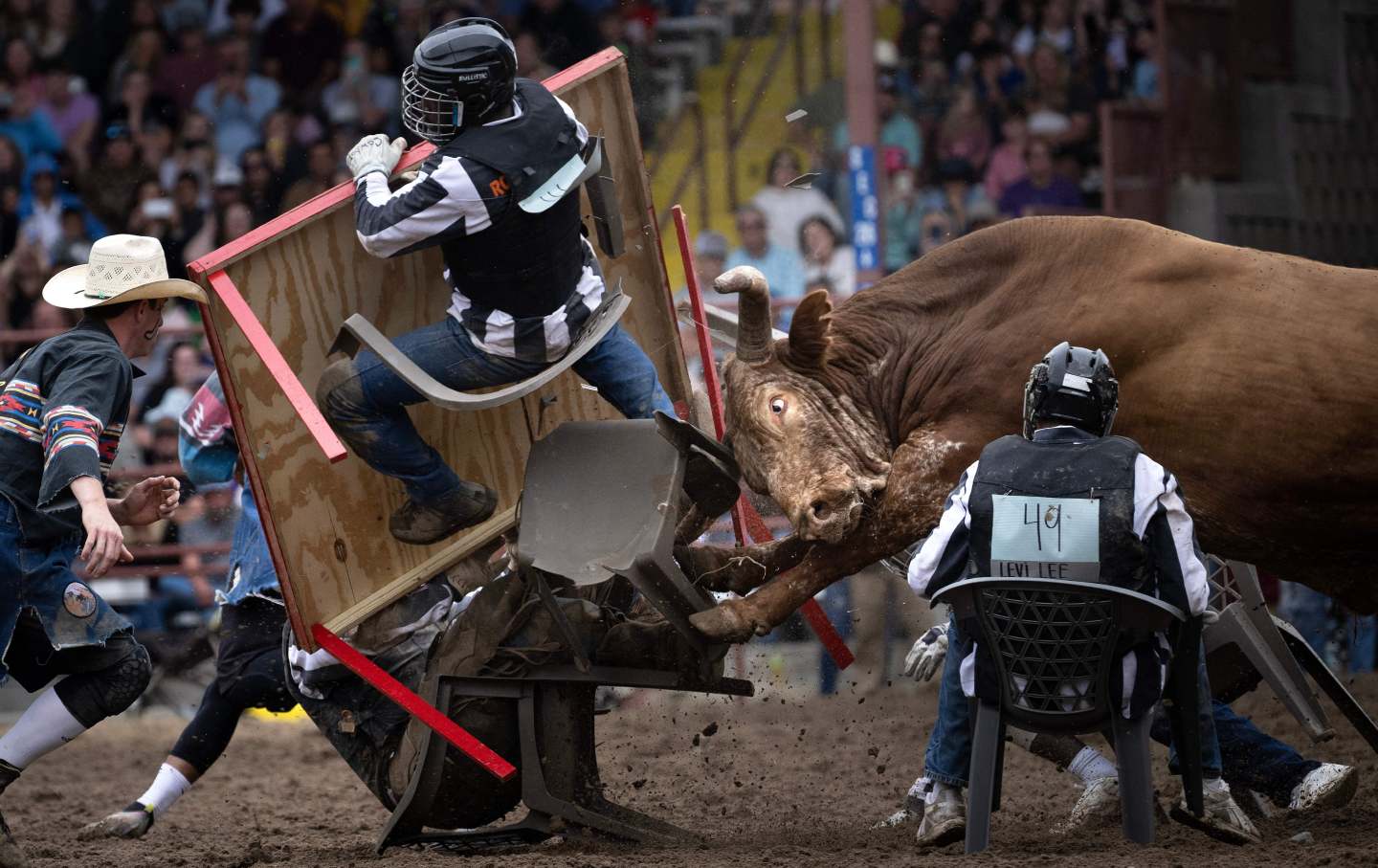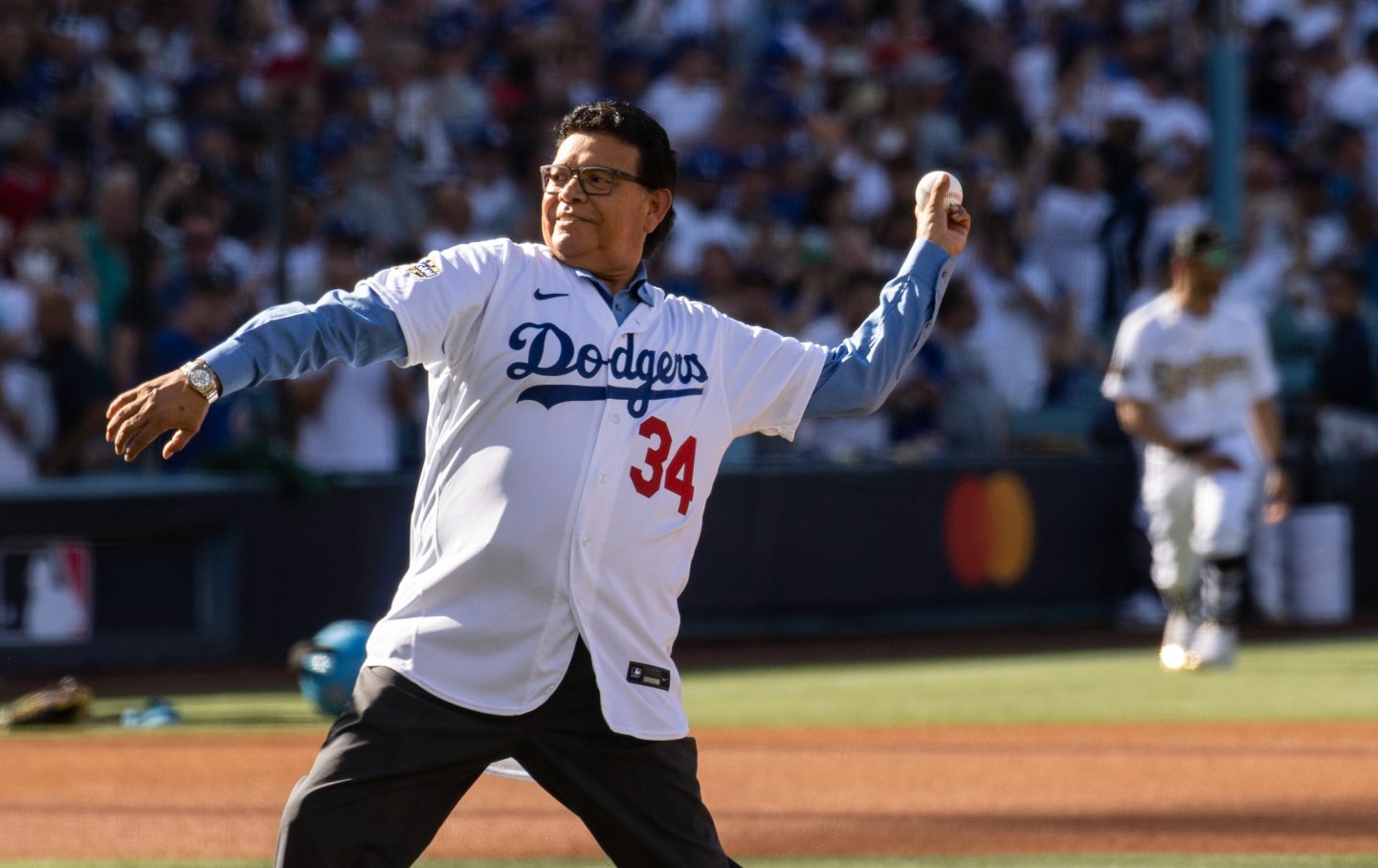Bill Walton Was Once a Trailblazing Radical
The basketball great is now better known for his tie-dyed shirts and enthusiastic sports commentary, but in the 1970s, he was a polarizing anti-government activist.
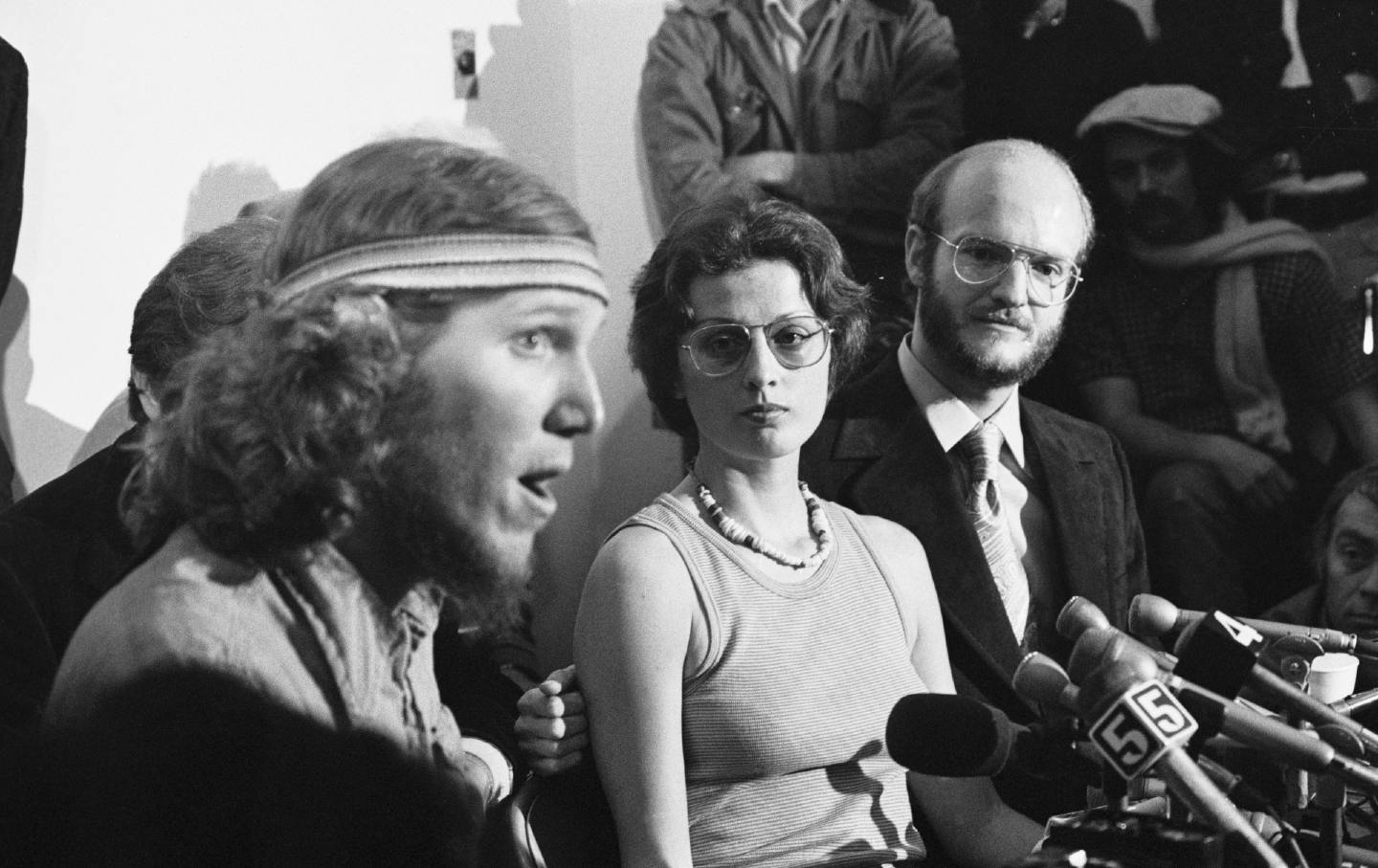
Basketball superstar Bill Walton speaks at a news conference at Glide Memorial Church in San Francisco, Calif. on April 9, 1975.
(Bettmann / Getty)These days Bill Walton, the loquacious, Grateful Dead–loving basketball Hall of Famer, never stops smiling. Steve James, the documentary filmmaker who brought us Hoop Dreams, recently helmed a four-part documentary film series about Walton and fittingly called it The Luckiest Guy in the World, a phrase that Walton says so often it’s as if he’s trying to convince himself.
Walton, now 70, wants to be all things to all people: a source of light, love, and unity. But this has not always been true. In the 1970s, he was among the most radical and polarizing athletes in the United States. That smile, so ubiquitous today, was not often shown by the young man concerned about the state of the world. At UCLA, Walton led one of the greatest college basketball teams in history—and he was also arrested for protesting the Vietnam War. Then, as a Portland Trail Blazer with a scraggly red beard and long hair, he spoke with a political edge that has been largely forgotten about amid the day’s toothy grins, tie-dyed shirts, and enthusiastic color commentary.
When James asks about his politics in The Luckiest Guy in the World, Walton shuts down, saying repeatedly that he was and has always been “in the mainstream.” While being against the war in Vietnam would put him in the mainstream today, that was not the case in 1970, particularly during a period when the Nixon administration used athletes and coaches as symbols of patriotism and the war effort. For Walton, especially as a white athlete in the era of Muhammad Ali, to take such an anti-war stance was a big deal. But Vietnam was not the only issue that animated Walton. While Walton stymied James’s efforts to understand his radical politics of the 1970s, we should not forget what Walton stood for. The 1978 NBA MVP has a record of rebellion from which athletes—especially white athletes—can still learn.
It is hard to imagine a superstar basketball player calling for resistance to the US government during a press conference. But that is what Walton did in the spring of 1975, when he appeared with his friends Jack and Micki Scott at San Francisco’s Glide Memorial Church, the congregation pastored by the radical Black minister Cecil Williams. The Scotts had just resurfaced after going underground to avoid harassment from the FBI for harboring members of the Symbionese Liberation Army (SLA), including Patty Hearst, the granddaughter of the newspaper magnate William Randolph Hearst. After Walton apologized to the Scotts for agreeing to be interviewed by the FBI, he called upon Americans to undertake “the practice of noncooperation with the existing government because of the inherent evil of that government.”
When Walton appeared with the Scotts at Glide Memorial, the Patty Hearst/SLA story was obscuring his own work as an activist himself. The press depicted Walton as a dupe of the Scotts. Yet even cursory observers of Walton’s career knew that the basketball star had developed his own political awareness. Since his college days, long before he met the Scotts, he refused to accept the role as the “great white hope” in a Black-dominated sport. Not only did he reject this position; he regularly highlighted the workings of white male privilege in press interviews. After his arrest at UCLA, he told sportswriter Billy Libby, “The Blacks have gotten a raw deal for a long time. A lot of my teammates are Black, and I really admire the way they’ve risen above their raw deal. They’re my friends and I feel for them. I know I’ve gotten twice as much as I deserve because I’m white.” He also told the startled sportswriter: “If a Black man gunned me down right now, I’d figure it was all right because of what whites have done to Blacks.” Just imagine a white athlete saying that today, especially in the aftermath of the Buffalo and Jacksonville massacres. They’d probably be driven from public life.
In Portland, Walton showcased skills unmatched by anyone near 7 feet tall. He also started having what would turn out to be chronic pain in his feet and refused to take pharmaceutical painkillers. Sportswriter critics blamed his injuries on his vegetarian diet and “alternative lifestyle.”
“What has happened over a period of months is that Walton has done things his employers would rather he didn’t,” journalist Craig Ammerman wrote soon after the press conference at Glide Memorial, “espouse radical causes, refuse to take pain-killing drugs, condemn capitalism, [and] become a vegetarian.” When Walton made it back on the court, he told the press that he “objected to the ‘Star Spangled Banner’ as the national anthem because ‘it is a political statement devoted to war, bombing, killing.” Maybe this is why Wells Twombly, the San Francisco Examiner sports columnist, surmised, “To most of his fellow citizens and many of his peers, Walton is nothing but a sociological traitor. The time for protest is past. That belonged to the 1960s.”
During Walton’s first three years in Portland, Jack and Micki Scott moved in with the star center, his wife, Susan, and their son Adam for three tumultuous years, much of which is documented in Jack Scott’s book, Bill Walton: On the Road with the Portland Trail Blazers. After the Carter administration dropped the government’s pursuit of the Scotts, the house became a place where people like Dick Gregory, Cesar Chavez, and leaders of the American Indian Movement, including Dennis Banks, and others, stayed. Walton played pickup basketball games with Banks, AIM organizer Russ Redner, and other activists in Portland’s Wallace Park. The book also documents Walton’s developing political vision during the mid-1970s. Around this time, Walton wrote an open letter defending Jack and Micki. It reveals Walton’s sophisticated analysis of US empire, political repression, and class exploitation:
Some of the actions of the government of this country that have led us to these conclusions are: the brutal assassinations of President John Kennedy, his brother Robert, and the Rev. Martin Luther King; the imperialist and genocidal wars that have been waged against the people of Laos, Cambodia, and Vietnam; and now possible US role in a war in the Middle East.
Also, the backing of a military coup that overthrew a democratically elected government in Chile, just because Salvador Allende’s economic politics did not coincide with those of special-interests groups in the country; the murders of students exercising their constitutional rights at Kent State and Jackson State, among many others.
Also the dichotomy that allows for the simultaneous rise of unemployment and corporate profits; the systematic suppression of natural living and healing methods; the double standards of justice that exist for poor people compared to rich people; the fact that if you are unemployed and broke and you steal to feed your starving family, then you face extremely long prison sentences in despicable places like Attica and San Quentin, while Richard Nixon, who tried to steal the country and jeopardized free elections, lives in luxury on the white sandy beaches of beautiful San Clemente.
Even while he struggled with injuries during his first few seasons in the NBA, Walton’s activism had grown beyond his opposition to racism and the war in Vietnam. He tied what we would now call the “prison-industrial complex” to the work of the CIA in the overthrow of Allende, the repression of the student movement, and the suppression of “natural healing methods.” Moreover, he possessed his own interpretation of the athlete-activist movement when he wrote:
The struggle of athletes to gain their rights is not new. It goes back years and years. Many athletes have given up their struggle because of the repressive conditions set by leagues, owners, and the media.
After identifying the examples of Muhammad Ali and Kareem Abdul-Jabbar, Walton ended his letter with a passage that reads like Marx’s labor theory of value:
We as workers must not forget the position we are in. It is our skills that create goods and services. And we must not allow outsiders to prevent us from doing the things we like to do and do so well.
This is not the Bill Walton of The Luckiest Guy in the World, and that is no fault of its director. Walton would not let him into that part of his life and mind. That is Walton’s right. But in a time when reactionaries are on the march, we need to remember the historical examples of courage necessary for today’s fight. We should cherish our radical heroes, and Walton—decades ago—was one.


